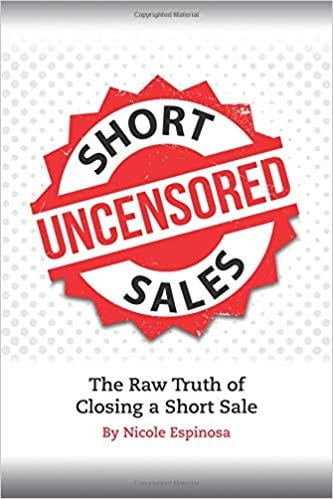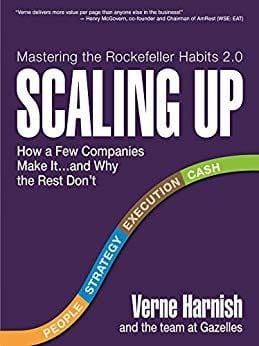
—
Listen to the podcast here
The Short Sale Queen with Nicole Espinosa
We are excited to have the one, the only, the amazing legend, maybe not only in our own mind but out there in the real estate market, our friend Nicole Espinosa. She’s known across the country as The Short Sale Queen. Nicole, how’s it going? For those that don’t know you, for our readers across the country, share who you are and what is The Short Sale Queen all about.
First of all, thank you much for having me on. I appreciate it. I’m happy to be here. What I do is I specialize in short sales. I am a licensed realtor and we help homeowners who owe more than the house’s worth. We settle their debt and we negotiate on their behalf at no cost to them, to the investor or any party in the transaction. We charge the lender our fee and we are able to help the homeowners avoid foreclosure, which is the biggest thing. These homeowners are in financial hardship and we help them move on with their lives and settle their debt so they can buy a house again, things like that. I got in the business, I’ve been doing this for several years and it hasn’t aged me at all. It’s definitely a passion of mine. We launched nationally. We’ve been hyperlocal in Dallas, Fort Worth area and then opened an office in Houston.
After Hurricane Harvey, we’ve been helping a lot of homeowners be able to sell the house as is because they couldn’t afford to sell the house with the condition. We average about 80 to 90 a month listings that were helping homeowners. Our goal is to be at about 150 a month that we’re averaging. We’re working with every major lender that you can think of, even names that you’ve never even heard of, and facilitate the process. Our average timeframe is three months from start to finish, and the industry average is about a year. It’s good if it gets approved. The biggest thing with whatever you decide to do, whether you’re an investor, whether you’re a realtor, you have to be passionate about it because it’s a lot of work.
The reason why most realtors stay away, besides the fact that they don’t know what they’re doing, is because it is a lot more work for almost sometimes the same compensation. We do a high level of it. It’s my niche. It’s all I do. I don’t work with traditional buyers. I don’t work with traditional sellers. We just make short sales. We’ve been able to be successful at it. Our close rate is 98%. If it doesn’t work, it’s not because we didn’t try every avenue. Generally, if it doesn’t work, it’s because the homeowner decided to do a loan modification or it came to us a few days before the sale date.
How long have you been a realtor for? How long have you been an agent?
I got in the industry many years ago and doing foreclosures. I’ve been licensed a few years.
I always like to know why short sales and how did you get invited to that? You’ve been doing it for a while. It has changed dramatically over the last several years.
I still come across investors that were like, “I used to have my own short sale department,” or “I used to do that myself.” The seasoned investors that have been around the block, they used to be able to process their own short sales and the guidelines have changed drastically. When people say, “I’ve done a short sale before,” I’m like, “When? Was it recently?” Like real estate, things are constantly evolving. They’re constantly changing. It’s the same for short sales. They’re so much strict, there are more guidelines. Back in the day, you could tell the bank, “This is a good price.” The bank’s like, “Let’s get it done.” Now it’s like, “No. We’re going to have two opinions. We’re going to do this, we’re going to do that.” It’s definitely putting us through the wringer the more things they decide to add to the process. As far as how I got into it, my first job was an assistant to a broker that was doing just foreclosures. REO, Real Estate Owned, we had about 150 a month that we were managing. It was high-level and it was chaos. It was like, “Figure it out.” I got thrown into it.
Thrown in the deep end and swim or drown.
I definitely proved that I could swim, but didn’t know how. I remember I was like, “What is winterization? What are homeowners this? What is that?” I had no clue. At the time, the banks didn’t either. The bank would send you a legal description. They couldn’t even tell us the address. They had to send us the legal description and we had to figure it out. Was somebody living there? What’s going on? What’s the address? Is there a homeowners association? The list goes on. At the time, it was horrible and chaotic, but it set the foundation for what I do now because I learned a bigger picture of how the banks worked, the system.
I swore when I got licensed and left, I was like, “I’m not doing anything with foreclosures.” My first listing was a short sale. It was one of those things where I was like, “Let me figure this out.” I liked the fact that the bank wasn’t my client. I knew that it was a hard job because we were kicking people out on the street. We had a whole eviction department. There are things that you see and when you go to the houses, we see the worst of the worst. I wrote a book about short sales, but I could write a whole other book about homeowners and the things that I’ve seen which I’m going to do when I’m retired. I don’t want homeowners to not work with me.
If you’ve seen that movie 99 Homes, it’s based on Florida and what some of the agents were doing. I’m not saying you were doing that at all. There’s stuff that’s going on and a lot of the homeowners don’t know their rights, don’t know their options. That’s why having an agent focused on short sales has built their expertise. As we all know, the riches are in the niches and you’ve built your niche in the short sales side of things. It gives you a little bit different flexibility not only on how you’re focused on this, you know your lane, you stick in it, but it also gives you a weekend, which most realtors don’t have a weekend.
That’s been such a blessing because I have two kids and I’m trying to catch up on the weekend, but it’s one of those things where I was able to spend it with them, and it wasn’t on purpose. It was, “This is a challenge. I like challenges. Let me see if I can figure this out.” At the time, when I was making short sales, there were no short sale departments. There was loss mitigation. It was one of those things where most of the people that I talked to, either an investor or a realtor, they were like, “Don’t even waste your time. The banks will not agree. You have no idea what you’re doing.” Over time, I became the expert from the hundreds of transactions of, “I did that before. I know I can do it again.” It was a true experience because there’s more education than ever, but how long has it been? There was no book, there is no course. I wrote a two-hour CE class that I still teach sometimes and it was the most detailed class that you’ll ever go to. I walk you through the entire thing, not what is a short sale. “This is what you’re going to deal with. These are the people that are going to talk to you.”

Short Sales: The Raw Truth of Closing a Short Sale
There was nothing like that. Even with my book, Short Sales Uncensored, I go into a lot of detail and I’ve barely scratched the surface. There’s such a need for that education even if you do not want to make short sales or facilitate the process that you have an understanding that you can better educate your clients. As an investor, understand how to talk to these homeowners that you have another tool in your toolbox. It’s all about education. It’s all about educating them and you are the professional. You’re the one that knows and you build rapport much quicker because you know what you’re talking about. It all goes hand-in-hand.
When you and I visited, we could talk for hours about short sales, marketing, and how the market has changed. I was on the phone with one of our borrowers being on the note side of where are we in the bank on us buying the notes. The borrower called me out of North Carolina with one of those options. I was like, “Can you start paying on time? Can you bring some extra to the table?” They were like, “I don’t know.” I was like, “We need to probably talk about doing a short sale, Cash for Keys or deed in lieu.” He goes, “What’s that?” I was like, “Let’s start educating here. Where’s Nicole’s book, I can send them?” The thing is short sales, a lot of people are like, “The market is doing great, especially in DFW. There can’t be any short sales out there.” That’s not necessarily the truth, right?
Correct. When I was thriving was when the market was the best ever it was. My broker, specifically, I remember at the time, was like, “How are you so busy? I don’t understand.” It’s because people have this misconception that because the prices go up, that automatically people are no longer upside down. What they don’t understand is that as long as a homeowner has a financial hardship, there will always be short sales. When you dive into it and you talk about loan modifications where people are behind for years, that’s their equity. The bank is not forgiving. Just because you are not making a payment does not mean that the bank is not adding to your principal or adding to the back of the note.
Even people that have done note modifications, it’s a great concept in theory, but it automatically puts you in an upside-down situation because of all those fees and everything like that. Back in 2015, 2016, the people that we were working with were the peak borrowers that were a few years behind. Even though the market prices increased in DFW because we have a strong market here locally, what does it matter? The prices could go up $20,000, $30,000, there’s still $100,000 upside down. It’s insane the things that we’ve seen where you’ll see an unpaid principal balance at $150,000 and the pay off at $250,000. You’re sitting here like, “How is that even possible that they’re allowed to charge that much?” That big stack of paper at closing, you gave him permission to do that.
I was working with another realtor up in Chicago who’s a student of mine, who is looking at a note deal where the unpaid balance was $550,000 but the payoff was $1.1 million, and the bank wanted $962,000 for the note. More than the unpaid balance, but less than the full payoff because the asset was worth $2.5 million.
That’s what most borrowers don’t understand because people in this situation, they’re desperate and that’s how they end up doing multiple loan modifications because they don’t see the bigger picture. Most people are better off selling right away. They did not explain that once you do the loan modification, their balance increases significantly. If it’s an FHA loan, they’re adding a HUD lien, they go to sell it and they’re like, “I didn’t know about this second lien.” I’m like, “That’s how they’re able to do the loan modification.” It’s a lot of that.
Let’s talk a little bit about all the things that go into a short sale package. Is it still as crazy as it used to be with both its tax statements, two years of taxes, hardship letters and you’ve got to have it listed and an offering before you can start the short sale? A lot of people don’t realize that there’s quite a stack of papers that have got to go to get it started across the starting gate.
You should see my printing bill, all of the paper and ink that we have. I always make a joke that we’re the only real estate agents that don’t get to be paperless. Everyone else is making jokes on Facebook about what’s a fax machine. I’m like, “Really?” We have an eFax and things like that because that’s how the banks communicate. That’s what we have to do. There’s a lot to it. We have our own custom packet because we’ve been doing this for so long so we know exactly what each bank is going to need. Some of the basic stuff is definitely a hardship letter. You have to identify what is the reason why you fell behind. The bank doesn’t want a five-page essay. They want short and sweet. If you were to divorce, we now know that there’s the same income but now two sets of expenses. That’s a hardship, things like that. They want the date when your hardship started. They want all of your financials. Your last two months of bank statements, your last two pay stubs. If you don’t have income, then you have to write a statement stating that you have none to provide, tax returns. You can’t hide anything. They’re going to be specific. We have had to write explanation letters for $50 deposits like, “Where’s that $50 coming from? Wells Fargo?” It’s like, “Really, $50?” Like that’s going to make a significant difference. It’s honestly up to the underwriters on how specific they’re going to get.
They need all that. They need the actual application depending on the type of loan or the actual servicer and the lender, and letters of authorizations. The biggest hurdle sometimes is where the sellers are like, “Why do I need to provide my financials?” We have to explain to them that, “You’re not applying for a new loan, but you are asking for assistance.” The bank wants to make sure that you have a legitimate hardship and that you’re not saying, “I don’t want to pay.” That’s how they find out. They want to make sure that you don’t have $100,000 in your account and you want them to take the loss. The only way to do that is to verify income with your tax returns, pay stubs and your bank statements. It’s thorough.
You have to provide all that stuff to get qualified for a loan. I like to call it the loan D qualification package. We have a question, “How can Nicole help us as note investors? Is she only in Texas areas?” She is now nationwide taking files all across the country. You’re doing stuff in Houston and Dallas. What other areas? Are you doing files all over the place?
Florida is a big one. We have Orlando, Miami and Tampa. We do have relationships with people in California. We’re in San Diego. We have two listings there. Illinois, Arkansas.
It’s important sometimes on the third party. When we’re talking to our servicing company about a possible thing, I’m like, “Why don’t we throw them in with a short sale company, let a third-party collect everything, and then we can make an educated guess?” They’re not going to approve a short sale in twelve hours or two minutes if I know exactly what it is. I’m doing this little different thing and I talked about this at my Note Mastermind with 40 investors that came in from across the country. I’m like, “If you’ve got a great short sale agent, talk to them and find out what banks are holding those files and then target the banks to say, “Use that lead that you’ve got,” trying to buy them out. It also becomes a warm lead towards future deals that we can say, “Nicole, do you want 40 other files with the same bank?” It’s a true win-win across the board. A lot of investors and a lot of agents said, “How many listings are you seeing?” You mentioned, “There’s only so many showing and that’s if they’re listed on MLS.” Are people able to make short sales if they’re not a true MLS listing?
A lot of the houses we sell are off-market. Let me start with my business, 100% referral base. I don’t market to homeowners and none of that. All of the 80 to 90 listings that we’re doing either an investor is the one that’s referring it to me or it’s a licensed realtor because they’re the ones that are coming across these homeowners. If an investor comes to me and says, “I’ve got this lead,” then they’re already interested in buying the house. Once we have a contract and we send it with our short sale packet, we don’t need to put it on the market because the homeowner’s already signed the contract. We don’t have to put on the MLS. If the bank requires us to, we will, but because we already have a contract, were able to bypass that requirement.
With the referrals, what’s the biggest hardship? Is it a divorce, job loss, sickness? What do you see is the breakdowns for hardships from the owners of these properties that you’re dealing with?
A lot of it is divorce. It probably is one of the top hardships, but honestly, it’s insufficient income. It’s where they had a higher paying job. To be completely frank with you, most Americans live paycheck to paycheck. It doesn’t take much to have a situation where you’re one month behind and now it’s a domino effect. Most people can’t afford to catch up for more than one month. What happens is they fall into that trap that they’re now two to three months behind. They have no way of catching up and then the bank is sending them the loan modification paperwork and it’s this whole thing. I probably get more people that have insufficient income than anything else. That’s a safe thing to say. The next would be divorce and then excessive debt, bad situations where they overpaid or overspent. A lot of people that were desperate for home ownership, which I think that’s what we’re starting to see this next 2020, 2021, especially here in Dallas.

Short Sales: The biggest hurdle sometimes is having to explain to the sellers why they need to provide their financials.
I know that we’ve had this whole market boom where people were overpaying. They were at the top of their budget and they were paying the difference between the appraisal because they wanted the house badly and all it takes is one thing to happen to you. You lost your job for one month or somebody got sick or you’re separated, and that’s it. You can’t afford it anymore. We don’t see adjustable rate mortgages anymore so that’s not a thing. It’s a lot of the fact that they overspent like they were already at the top of their budget.
There are 1.9 million homeowners with traditional banks that are at least 30 days behind on mortgage already. 85% of Americans are one missed paycheck away from being in default.
The people that we see, we break down their monthly expenses. I go over everything and you’ll see people that’ll spend $2,500 going out to eat. Their mortgage is $1,000. It’s one of those things, money management, and they don’t save. The other common thing is that the house needs repairs. In those situations, they are like, “It was either fix the AC or pay my mortgage.” They’re at that situation where they don’t have extra funds so they’re taking the funds from what they would use or allocate for the mortgage to fix the house. That’s another common thing that happens.
One of the things we’ve seen is they’re putting everything in they can to get on a budget payment and then working the extra hours, the overtime and then when they get cut back in hours. Overtime is not guaranteed, they fall behind. One thing we’ve seen too in the past and we’re starting to see a bit more is all the new homes are being built where people are getting to the budget with a low tax appraisal. When their tax appraisal changes, especially the first part of the year, it’s taxed at the full value of the property versus a lot, probably starting to see some defaults from that too.
A lot of the referrals that we’re getting in the last few months are new builds. It’s not only that, but it’s also the fact that they put nothing into the house. They were putting $1,000 and that’s it.
They’re putting nothing down. We did have a mortgage company here but they moved out. They were talking about how they’re doing 100% financing, 520 FICOs. Their company’s donating the down payment for the FHA loan.
Some people shouldn’t buy a house. I know that salespeople don’t want to hear that. If you have a 520 credit score and no money, how is that financially responsible? It doesn’t make sense to me. I have to look at it as we’re like a hospital and I can tell you all the time not to eat bad, but you’re going to get bad so we’ll fix you anyway.
When you get your file folders or get through the money drama deal and borrowers and they’ve provided a clean file to you, do you still have to fax these over to the bank? Most of the banks have an online system like Equator or something like that which you can use to upload. Does it depend on the lender?
It depends on the lender, but about 80% of them are faxed. We have an eFax. We’re definitely not standing there and fax machine, but we basically upload everything into a PDF and then fax it online. Everything’s done electronically. Everything’s faxed. Even the lenders that are using Equator, a lot of times open it up, you’re faxing it in and then they’re assigning you in Equator, which doesn’t make any sense.
Equator was started by Bank of America, but different companies started using it.
Bank of America was using it for REOs. When I was doing foreclosures, that’s all we did through all of our REOs, and then they adapted it for their loss mitigation for short sales when that became a thing. It was Ocwen and Mr. Cooper, which was Nationstar. I remember when Chase first was adapting to it. None of the negotiators would use it. It was like, “You have to do it,” but they were used to their emails and stuff and it was like, “Get on board here.” It’s great if they would utilize it, but a lot of times we’re still emailing outside of Equator or we’re still doing a lot of stuff because we’re like, “We’re not another file. We need to get this moving.”
You talked about speed being you guys doing well in 90 days roughly versus a few months or a year in some cases with different states and foreclosure time frames. Without giving away the secret sauce, what do you think has been your biggest asset when it comes to being successful at 97% of the time? Is it that you guys follow up on a regular basis? If it is, will you talk a little about how much of a follow up is needed on short sales?
I’m an open book. I don’t think there is a secret sauce. I teach classes and I tell you exactly how we do it. The difference is that we don’t give up. We’re tenacious and consistent. Most realtors or people that are doing this, if they get no as an answer they’re like, “The bank said no.” I’m like, “It doesn’t work that way.” We try every avenue. If it doesn’t work, it’s something that’s not in our control, like the seller deciding to stay and the bank approved them for a loan modification. Even if that doesn’t make sense, we’re always going to do what’s best for the client. If you feel like that’s what’s best for you, then no problem. Truly, if you qualify for a loan mod, then you wouldn’t qualify for a short sale anyway. It’s rare that happens because we do pre-qualify the homeowners because I’m not going to spend a few months’ time, money and resources if we’re not getting to the closing table. It’s a reality.
As far as what makes it different, we’re tenacious. We know with experience, Bank of America is this way, Wells Fargo is this way. It truly is down to that because if you do a Bank of America short sale and then you do a Wells Fargo or Ocwen, you’re going to have a completely different experience. Do you know what type of loan it is? If it’s an FHA versus the conventional, how do you get through the process or get it moving? There are many variables to it. It’s not like traditional real estate where you’re like, “Let’s put it under contract.” It’s straightforward and the short sale is a whole other world. If you’re not in the world, you have no clue. We’re right over your head.

Short Sales: If you qualify for a loan mod, then you wouldn’t qualify for a short sale.
What are some of the biggest mistakes that you see agents making? Is it listing a property for full value or giving up at the first no? What are some of the things that you see routinely happen?
The biggest mistake is that the agents don’t understand the process so they wait for the banks to call them. It’s like the blind leading the blind. That’s the best idiom to use because most of the negotiators that I’ve talked to, they’re managing 500 to 800 at a time.
Each negotiator you’re dealing with, on average, is negotiating how many files on their desk?
500 to 800. When I talk to realtors, I’m like, “You’re stressing out about your five deals. Imagine managing this portfolio of these many things that are assigned to you.” You can’t possibly get to even half of that. As a servicer, if they get to at least 20%, they’re considered successful. That means that the other 80% is sitting there, not moving, not being touched, but still moving towards foreclosure. A lot of times the realtors don’t know the right questions to ask. They’re like, “The bank hasn’t called me yet and it got foreclosed on,” and they had no idea. It’s unfortunate, but a lot of the ones that you see canceled like an MLS or things that happen, they throw their hands up in the air and be like, “The banks should have told me.” They’re not going to call you. This is not a thing.” The most common thing I see is that the agents are waiting for the bank to tell them what to do. Back in the day, Bank of America came out with a stat that 20% of short sales were successful and the other 80%, the reason why they failed is that the agent didn’t understand the process and was not submitting the correct paperwork. It was a lot of the fact that the Bank of America was saying, “You were supposed to send us this, but you didn’t fill it out all the way or you didn’t know what to do so we declined the file.” It’s shut down. That’s a lot of it.
Being an ex-mortgage broker, one of the things we used as an analogy is if we wanted to get from where we’re at the beginning of the hallway to the end of the hallway down the road of closing at the closing table was that we had all these doors. Anytime there was a note on the door, whether it was the appraisal, the hardship letters or things like that, anytime we didn’t have the door open it would go in and it would delay things. It’s a lot of the same way you’re telling me. A lot of agents are expecting it could be a quick trip down the hallway to the end. They’ve got to provide those updates, that correct paperwork, and correct forms filled out so that they can keep those doors closed. It’s a short journey at that point.
They definitely underestimate the process. They’ll say things like, “I called the bank and they said they’d do it.” If it was that easy.
If it were that easy, every agent would be doing it. What’s been the longest short sale and then what’s been the fastest short sale for you?
The fastest was a reverse mortgage. I did it in three weeks. I had contact with the servicer and it was straightforward. With reverse mortgages, because it was an airstrip and the borrower had passed away, we didn’t have to do the financials and the appraisal. It was one of those things where we got it done right away. The offer was in line with the 95% they’re willing to accept. I got approval. If that happens, I’m going to go with it. The investor, it was his first time ever sending me something. That was the bar and it was frustrating for the next one he sent over because he was like, “Nicole, three weeks,” I was like, “Don’t tell people that because that’s not the norm.”
You don’t want to under promise and over deliver on the front end or something like that. It’s not the norm.
I remember he tagged me on Facebook and I was like, “Don’t say that.” You get acknowledgment for when something amazing happens, but set expectations. After three weeks, they may be like, “Why is this taking forever? I don’t understand.” It’s been two months now,” I’m like, “It’s still good.” The longest one we closed, I was holding my breath on this one. It was a little bit over a year and at this point, it didn’t even make sense financially for us to work on it this long, but that’s not what we look at. We were truly trying to help this lady. It was a hoarder house. It was a bad situation. They divorced because he was abusing her and all this other stuff. We got the house approved three times, three short sale approval letters. I did my job. The first time, the buyer walks because the roof ended up collapsing. The second time, the IRS approved it but then the buyer walks and then when we had to get the extension, they walk. There were many moving parts, everything had to line up. I’m grateful that it’s over.
Roof collapsing, hoarder house, IRS tax liens got to get removed.
It got removed or it got released, but then it expired. We had to go back to the IRS and then bonanza. My assistant was like, “It was a bonanza because,” and then it got completely shut down. She reminded me of the government shutdown. When the government shut down, we couldn’t get the extensions to the IRS release, so we had to start all over and it was like, “These are killing me,” and I don’t talk about politics. I was like, “Get it together.”
How long does it take you on average to get an IRS tax removed? A lot of the investors, they see that, they flip out and they don’t realize that if the homeowner’s not receiving anything, you often have it removed.
Two ways you can get an IRS release, the discharge is through a short sale where the homeowner is not receiving any funds. The second, you can get a discharge if you can prove that there’s an existing payment plan. You can also do that as well. If they’re paying on it, it’s a couple of years, it’s still within that time frame, you can get it discharged as well. It’s against the person, not the property. That’s how we’re able to get it discharged.

Short Sales: You can get an IRS release through a short sale where the homeowner is not receiving any funds or if you can prove that there’s an existing payment plan.
If they’re in a payment plan through the fresh start initiative or something like that, it can be removed. That should be a nugget out there for our audience. I know it varies when you have your hoarder house with no roof and a tax lien attached to it versus your pristine houses. You’ve got a nice one that you’re working on in Houston with a $550,000 value to it. It’s a five-bedroom, five-bath house and looks nice. If it’s a good looking house and it doesn’t need much work, what percentages are we talking about that you’re negotiating them down to? It’s probably not $0.60 on the dollar or $0.50 on the dollar anymore. What do you see them at?
With the properties that are in great condition, those are probably the most difficult because it’s hard to negotiate when you don’t have repairs for value. How we get the major discounts are the roof collapsing or the repairs of the foundation or things that are structurally affecting the value because we can only get a cash offer at that point. With the properties that are in pristine condition, generally what we do is talk to the appraiser. We show the days on the market. There are a lot of things that we can talk to them about for the simple fact that it has to be an aggressive price if someone is going to go through this property, buy it as is, even if it’s not an investor, even if it’s a traditional seller or a buyer. In that price point, people are used to it being absolutely perfect and with home warranties and all this other stuff. When they submit offers to the bank, they’re like, “It’s going to be as is and we’re not paying anything.” On those, I don’t have a percentage for you. We do definitely get it to undervalue because we explain to them it has to be this way. As far as repairs, we try to be as proactive as possible. We get repair bids from the investors and we present it to the appraiser because if we leave it up to the appraiser, I’ve seen appraisers who needed to go somewhere else.
I had this guy who I asked for a copy of the appraisal and it was $1,000 for the roof. I’m like, “In what world can you get a roof for $1,000?” I tried to reason with them from a common sense perspective of, “I know you don’t care, but I have to sell it at this price. If you look at it and the bank is going by what you say, how am I supposed to do this? Would you pay for this? You buy it then at the price that you suggested.” A lot of that is trying to have that conversation with them, pleading with them, telling them what we have is the offer because if the property is distressed, it has to be discounted. Whether it’s going to the investor that sent it to us or another investor that’s paying cash, I know that everybody has different margins, but they need to be able to do that to be able to fix it, flip it or whatever they’re trying to do with the property.
We have a question, “Is dual tracking still happening for closing on an asset that is in a short sale negotiation? I thought that was banned.”
The lender has the right to foreclose at any time as long as they send the legal notices. Even though they are reviewing a loss mitigation option, they can foreclose at any time. We have a ton of short sales. If you looked at my board, we have twenty that were getting postponed and even though some of them are in the middle of a short sale, we’re still trying to get the sell stopped. The bank has every right to do that.
It brings up a good two-part question. What are you guys using to help get stuff delayed? You’re pleading with the negotiators, but if somebody probably brings a file to you a week before the foreclosure auction, is that probably a lot harder to get delayed?
It is. It’s all going to depend on the state and the foreclosure laws in Texas. We do have a different couple of ways that we can get it postponed. With legal options, they can do a TRO, they can file bankruptcy, and they have to seek counsel for that. With us, we have relationships with a lot of banks. We’ll plead to our contacts, we’ll go to the foreclosure attorney and submit requests. We try to hit every avenue if it’s less than the 30 days of the postponement. Most people don’t see me in the last couple of weeks of the month. My phone is ringing where everybody has exhausted every option and they’re like, “Give it to Nicole.” “I have this performance but Nicole, stop it.” I’m like, “Okay.”
That’s generally what we do. We go through every option. We get the history of the loan, but the closer it is to the sale date, the less leniency that the bank has because people think that they’re playing the game several years. I talked to this guy, he was several years behind and he was calling me with a couple of weeks beforehand. I said, “I’m not doing it. I can’t. You have to get it stopped.” He was like, “Why?” I was like, “You’re several years behind. I don’t have any pool here. You’ve been playing the game for so long, there’s nothing I’m going to be able to do because they’re basically going to say F you.”
Several years behind, that’s quite a bit. What state was that?
It’s here in Texas. At that point, anybody that’s more than a few years, they’re professionals. They know how to play the system and those are the worst clients because they live in this other alternate universe where they believe that nothing is ever going to happen to them. At some point, because nothing has happened, no recourse, they’d been living for free and they never have any money. It’s not like they’ve been saving for several years, but they think that, “Don’t worry, I’ll get it stopped. I’ll call him. I’ll file bankruptcy again.” It eliminates their options and it’s short-term thinking because after that, then what? You can’t do anything. If it’s a certain type of loan like an FHA loan, they have a HUD requirement that you can’t be more than a few years behind to be reviewed for a short sale. If it’s HUD, you’re out. All your options are gone.
We deal with the borrower’s living in belief. He was like, “Obama is going to save my house,” or “Trump’s going to save my mortgage.” I was like, “I’m not Trump or Obama. I donate to charities, but it doesn’t mean I run one. I’ve often found on a lot of the houses that we foreclosed on or we ended up taking back, there’s always a big screen TV, three or four Nintendos, Xboxes or whatever. No books.
Everybody has a cell phone. Everybody has an iPhone. It’s unfortunate. We say that but we also see people with legitimate hardships. It does go on both ends. Those clients are the worst. They truly are the worst to deal with. A lot of it is rewiring and setting their expectations of reality. Sometimes I’ll tell my staff, I’m like, “They need to get foreclosed on.” I’m like, “They literally need to get thrown out to understand the world again.”
They need a shock to their system to come to reality. You can’t help everybody. You can try to help those but some people don’t need to be helped because they’re their biggest and worst enemy.
You can’t help people that don’t want to help themselves.

Short Sales: The worst clients are those that live in an alternate universe where they believe that nothing is ever going to happen to them.
What do you do to relax? I know there are a lot of deadlines, a lot of reaching out to these asset managers or the loss mitigation people, many files and they’re paid hourly. They don’t care half the time. You’ve been doing this for several years, you’ve had guaranteed ups and downs and it’s a bit of an emotional rollercoaster trying to get things delayed and dragged out there. What do you do to recharge your batteries?
Yoga has been life-changing. I’m a lot of things. I’m running this business. I’m doing all this stuff and I’m also a mom. It was almost like everything was first instead of me. When I go work out, when I go do yoga, when I do that thing, it’s a mental thing. It wasn’t even about losing weight. It was more like not having to look at my phone. A lot of times, if I’m starting to get super burned out, I’ll turn my phone off or I’ll put it on don’t disturb. Even though ideally in this business, all we want is our phone to ring, disconnecting is important because our lives are based around this little screen all day, every day, on social media and our email. Email is number one, and text messages. I do more business through text and email than anything else. It’s about disconnecting. It’s hard to do because I’ll get a massage, I’ll do this and the whole time I’m thinking like, “Did I submit this? Did I call them back?” It understands that even though we have that sense of urgency, if I take this hour, there are no real emergencies in real estate. That is something I heard when I went to this convention for Keller Williams. It stuck with me because I was like, “You’re right. I’m not an EMT.” Even though I feel like it’s the ER, no one’s bleeding out. You can wait for an hour, and you will be fine.
I’ve made my entire career being available for investors, realtors and my clients that I had to set boundaries. I remember at one point I’d have clients call me at 7:00 at night. It was one of those things where I’m hiding in the closet because of my daughter’s talking and my son. My daughter was young at the time that she didn’t get why I was like, “Shut up. Stop it. I’m on the phone.” I remember one time I was like, “I’m not doing this anymore.” I answered right in front of her. I was like, “I’m sorry. That’s my one-year-old daughter.” They were like, “Can I call you tomorrow?” I was like, “You should call me tomorrow,” because you’re asking me a question that you can talk to me during the day and now you’re messing with my time with my family. I understand you’re stressed out about this that I had put those boundaries. I’m not perfect when it comes to that because I’m a workaholic. That’s the entrepreneur in me, always trying to create and build, but that was the biggest thing for me for sure.
That says a lot because with the systems these days, one of my favorite tools is Slydial. It leaves a voice message for people. I didn’t want to have a 50-minute conversation. I need 50 seconds.
We have many of those clients. Me and Stephanie, she’s my office manager, we joke all the time. We’re like, “Wednesday, we don’t have to have a 45-minute conversation with that seller anymore. It was done.” Do you know those people that love to talk? You’re like, “Come on, I’ve got to go.”
There was one time I had somebody on the phone talking. I was sitting here in my office like, “I’ve got to go to the restroom.” I put it on speakerphone, left the phone, went into the bathroom, got a cup of coffee, came back and they were still rattling on. They didn’t even know that I was gone. I wanted to send them a photo and say, “Talk to the photo. You don’t need to talk to me.” You’ve got an amazing team. How big is your office in DFW? You’ve got Stephanie to the side, your right arm.
She’s definitely my right hand. I cannot do it without her. I would not want to. I would not have sanity without her. I’ve got four VAs, Virtual Assistants, and then a full-time assistant here. I have agents on my team. They do traditional real estate. I have four real estate agents on our traditional team.
That’s awesome you’re using VAs. Is that in a lot of the document collection, uploading, faxing aspect of it and tracking that for the most part?
The longest part of our process is staying on hold. It truly is. When I put the systems in place, it was about streamlining. Where’s our time better spent? That’s a constant thing that’s evolving. As we scale, it’s being obsessed with the process. You can ask Stephanie, I’m like, “I thought about this. What can we do with this?” The VAs helps with that. They don’t do any actual negotiations or anything that matters in the sense of communicating with the banks. We’re telling them, “This is what we need you to do. Stay on the phone with Wells Fargo for 45 minutes and make sure they got our fax. Make sure they saw our email.” A lot of it is staying in front of them that we don’t have to worry about it going to the 80% that don’t close or get work done.
It’s that touching aspect, touching with them on, “You got this,” or “You didn’t call. Fax it again.” It’s whenever you’re dealing with that. Some people have such a huge inbox of things. I used to remember where they had one central fax number and the twenty asset managers that were aimless had to go check the fax number, see if it was actual files. They didn’t have their own individual ones. It was a group one. Do you still see that?
I don’t know honestly if that’s the case, but that’s how it sometimes feels where we’re like, “We sent three.” I can envision someone walking over to the fax machine and being like, “Let me see. I don’t care,” and throwing it away.
What’s the best way for people to get ahold of you? Whether they’re reading and they’re facing financial struggles, looking to short sale or investors are looking to dive in, they have something from their marketing. What’s the best way for people to reach out to you?
The best way is email. I say that because that way it’s 24/7. My email is straight forward. NicoleIsYourRealtor@Gmail.com. You can also call the office at (972) 832-2621. I always recommend email because that way, it’s in writing and I can always get back to you.
What’s a book that you’re reading if you’ve got a chance to read? If you’re not reading, what’s a song on your iTunes that you listen to or jamming out to?

Scaling Up: How a Few Companies Make It… and Why the Rest Don’t (Rockefeller Habits 2.0)
I got finished reading Scaling Up, which is a good book. I always say that I tend to lean towards books that are either self-improvement for me as a leader and entrepreneur or something that’s systems because it’s the opposite of how I think. I’m a salesperson. I’m not a systems person. I almost have to rewire my brain to think that way. Scaling Up is a great book especially if you’re running a team or even if you’re an investor who is managing people because it talks about hiring intentionally and how to be intentional with the type of personalities, the people that you’re putting in place and letting go. A lot of us sometimes work hard in building this that we’re like, “That’s my baby. Don’t touch it.” There’s no way you’re going to be able to be a sane human being, grow and still put your hand in every single aspect of your business. It’s not realistic.
Many entrepreneurs suffer as control freaks. You hit the nail on the head there. You’ve got to delegate.
I’m number one. I’m speaking the truth. I’m such a control freak, but I’ve had to let go especially because these businesses, as an investor or a realtor, we’re the brands. We’re the ones that are doing it. When you grow, it’s hard to get out of that mentality of being the person that has the boots on the ground and doing the work.
I heard a little story that you heard that your idol was coming to Dallas for an event and you snuck in to meet up with this idol from Shark Tank.
Barbara Corcoran is on Shark Tank. She came to Dallas at an event that Champions was sponsoring. The broker does it. At the time we were one of the sponsors and they were only the staff. I was like, “I’m going. This is happening.” They were like, “We only have five passes.” I was like, “We need to figure something out.” I showed up and I was like, “I’m here.” They were like, “Nicole, no. You’re still not coming. Forget it.” I snuck in with all of them and I told her, “I wasn’t supposed to be here, but I wanted to meet you.” I asked her one question. I was like, “I know that everything is a part of your story, but if you could do it all over again, what would you do differently?” She said that everything has fallen into place, whatever. She said that she would have listened to her gut more. I thought that was powerful because we try to overcomplicate things or justify things in our relationships with what we’re trying to do. If we would stop and listen to our intuition on if we have a great idea or with our business, we would get there a lot faster. Anytime I’ve ever been screwed over or something has gone south is because I didn’t listen to my gut. I thought that was simple but powerful.
Our guts are our sixth instinct to help us out there to overcome an obstacle or anything. It’s our compass. It points in the right direction a lot of times. Once again, you’ve read it here. Check out NicoleIsYourRealtor@Gmail.com if you want to reach out to her. Check it out and she’s got the book. It’s on Amazon, Short Sales Uncensored.
You could buy the physical book and it will be on Audible soon.
Congratulations. I know you’ve been working on that. Thank you so much for taking time out of your busy day. I know you’ve been busy. Thank you so much for coming on the show.
It’s my pleasure. Thanks for having me.
You’ve got some great nuggets there from Nicole sharing how why she is The Short Sale Queen and doing things across the country. Some great tips to keep in mind if you’ve come across a deal either through direct marketing or you’ve got a borrower that you’ve bought the note on, and a short sale might be the option for you as well. Go out, take some action, and make some things happen. We’ll see you at the top.
Important Links:
- Nicole Espinosa
- Short Sales Uncensored
- MLS
- Equator
- Bank of America
- Ocwen
- Mr. Cooper
- Chase
- Keller Williams
- Slydial
- NicoleIsYourRealtor@Gmail.com
- Scaling Up
- Champions
- Short Sales Uncensored on Audible
About Nicole Espinosa
 Nicole Espinosa author of “Short Sales Uncensored” and owner of The Short Sale Queen. Nicole and her team average 80-90 short sales a month in the Dallas/Fort Worth area and has recently launched her company nationwide.
Nicole Espinosa author of “Short Sales Uncensored” and owner of The Short Sale Queen. Nicole and her team average 80-90 short sales a month in the Dallas/Fort Worth area and has recently launched her company nationwide.
Nicole has been featured on several real estate panels, as well as teaches classes on short sales to other brokerages, title companies and realtor associations.
Nicole’s extensive knowledge in distressed properties has made her the market expert when dealing with difficult transactions

